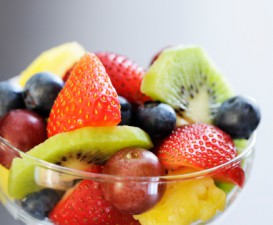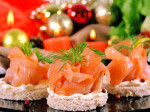 For the past year sugar has been in the media spotlight.
For the past year sugar has been in the media spotlight.
It is now well recognised that if taken in excess, sugar (particularly sucrose) added during the processing of foods and beverages, increases the incidence of dental caries, type 2 diabetes and obesity. 1
But what about fructose, the sugar that intrinsically exists in fruits and vegetables? Could this be injurious to our health too?
In New Zealand we are encouraged, as part of the 5+ A Day promotion, to eat 3 servings of vegetables and 2 servings of fruit the size of our hand each day.
Over summer it is easy to exceed these amounts. Although root vegetables such as potato, taro, kumara, parsnip and yams do contain more starch and their intake should be controlled by the overweight, leafy green vegetables; salads; carrots and pumpkin can be eaten in any amount.
These vegetables are rich in vitamins and minerals many of which are anti-oxidants and good for our health. They are also bulky and high in fibre and soon fill us up, which in itself limits the amount we can eat.
Fruit, on the other hand, does contain the sugar fructose and over summer it’s easy to eat too much. While fruit does provide a lower fat alternative to snacks such as cheese and crackers, muesli bars, crisps, cakes and biscuits, if we are to limit fructose intake we need to keep our fruit servings to around 2-3 pieces per day and maybe learn to snack on vegetable sticks and hummus instead.
What is the problem with fructose?
It’s very plentiful
Fructose is the sugar found naturally in plants, honey, tree and vine fruit, flowers, berries and most root vegetables. Fructose can also enter our diet through table sugar, high fructose corn syrup, agave nectar, molasses, maple syrup and fruit juice. 2
It’s very sweet
Although fructose has a low glycaemic index of only 19 compared to 100 for glucose and 68 for sucrose 3, it is excessively sweet in fact 1.73 times sweeter than glucose 4.
Fructose is also more rapidly metabolised by the liver than glucose and at high levels fructose may lead to increased blood levels of triglycerides and lactate. This can be of particular concern to those who are overweight, diabetic or have elevated blood cholesterol levels.(see more in Fructose and health)
It’s easily manipulated
Commercially fructose is developed from cane sugar, sugar beets and corn. It is inexpensive and commonly added to foods and drinks to improve the taste and palatability and in the case of baked goods it improves the browning and shelf life of some food products. Fructose is also more soluble than the other sugars making it a pliable ingredient in confectionary. 5
It comes in different forms
Fructose exists as a free monosaccharide or bound to glucose as sucrose which is a disaccharide. Fructose, glucose and sucrose may all be bound within foods in varying proportions. 2
Fructose and Digestion
During digestion fructose absorption from the small intestine is aided by a protein transporter GLUT5 and also a glucose transporter GLUT2. When fructose enters the diet bound to glucose (as sucrose) in a 1:1 ratio, absorption is greater than when fructose is absorbed alone as a monosaccharide. 6.
Table 1 The balance of sugars present in 100g servings of raw fruit and vegetables
| Food per 100g raw | Total | Total | Free | Free | Sucrose | Fructose/ | Sucrose as a%ge |
| Carbohydrate | Sugar | Fructose | Glucose | Glucose ratio | of Total sugar | ||
| Fruit | |||||||
| Raisins, dried | 66.8 | 66.8 | 35.2 | 31.6 | 0 | 1 | 0 |
| Banana | 20.8 | 15.2 | 5.1 | 5.1 | 5 | 1 | 33 |
| Grapes,black | 15.5 | 15.5 | 7.8 | 7.7 | 0 | 1 | 0 |
| Pineapple | 11.4 | 11.4 | 2.7 | 2 | 6.7 | 1 | 59 |
| Pear | 11.8 | 11.8 | 8.7 | 2.4 | 0.7 | 3 | 6 |
| Apple | 10.8 | 10.1 | 6.7 | 2.4 | 1 | 2.5 | 10 |
| Apricots | 9.8 | 9.7 | 4.1 | 3.5 | 2.1 | 1 | 22 |
| Blueberries | 9.3 | 9.2 | 4.9 | 4.2 | 0 | 1 | 0 |
| Orange,naval | 8.5 | 8.4 | 2.3 | 2.1 | 3.9 | 1 | 46 |
| Kiwifruit | 8.3 | 7.9 | 3.3 | 3.2 | 1.4 | 1 | 18 |
| Peach | 7.9 | 7.9 | 1.3 | 1.2 | 5.4 | 1 | 68 |
| Strawberries | 6.5 | 6.5 | 2.9 | 2.4 | 1.1 | 1 | 17 |
| Cantaloupe melon | 5.2 | 5.2 | 2.5 | 1.4 | 1.3 | 1.5 | 25 |
| Tamarillo,red | 3.8 | 3.5 | 0.9 | 0.8 | 1.7 | 1 | 48 |
| Tomato | 2.6 | 2.6 | 1.3 | 1.2 | 0 | 1 | 0 |
| Vegetables | |||||||
| Kumara | 25.7 | 9.6 | 0.5 | 0.7 | 4.8 | 1 | 50 |
| Potato | 15.4 | 0.3 | 0.05 | 0.15 | 0.1 | 0.5 | 33 |
| Corn, Kernel | 19.9 | 1.5 | 0.2 | 0.9 | 0.4 | 0.3 | 27 |
| Yam | 14.6 | 0.7 | 0.1 | 0.2 | 0.4 | 0.7 | 57 |
| Pea, green | 9.3 | 5.8 | 0.4 | 0.3 | 5.1 | 1 | 88 |
| Carrot | 6.8 | 6.6 | 1.3 | 1.4 | 3.9 | 1 | 59 |
| Pumpkin | 6.1 | 4.1 | 1.2 | 1.4 | 1.4 | 1 | 34 |
| Onion | 8.5 | 8 | 2 | 3.6 | 2.4 | 0.6 | 30 |
| Beetroot | 5.9 | 5.9 | 0 | 0.2 | 5.7 | 1 | 97 |
| Beans, green runner | 4.2 | 3.2 | 1.3 | 1.1 | 0.8 | 1 | 25 |
| Cucumber | 1.9 | 1.8 | 1 | 0.8 | 0 | 1 | 0 |
| Lettuce | 1.1 | 0.4 | 0.2 | 0.2 | 0 | 1 |
0 |
Ref Food Works® 2015 7
- The fructose/glucose ratio is calculated by dividing the sum of free fructose plus half sucrose by the sum of free glucose plus half sucrose. The figures have then been rounded
- Note dried fruit is a concentrated source of carbohydrate compared to most fruit and vegetables
Some foods such as apple and pear have almost twice the amount of fructose as glucose and so may be harder to absorb. This may especially affect young children, particularly when these foods are taken as juices. The immature cells lining a childs intestine have less affinity for fructose absorption than glucose and sucrose. Unabsorbed fructose creates a higher osmolarity in the small intestine which draws water into the gastrointestinal tract causing osmotic diarrhoea 8
Athletes may also be affected by fructose malabsorption as exercise can reduce the transit time of fructose traversing the gut leading to diarrhoea. 9
Incompletely digested fructose in the large intestine can become a source of nutrients for colonic bacteria increasing the production of short chain fatty acids, hydrogen, carbon dioxide and other gases causing “Irritable Bowel” like symptoms e.g. gastro-intestinal pain, bloating, flatulence and diarrhoea. As the hydrogen moves to the lungs it can be picked up by hydrogen breath testing which is proving to be a useful tool in diagnosing fructose malabsorption. 11
Where necessary a FODMAP diet can help to identify foods that trigger these “irritable bowel” like symptoms caused when short chain carbohydrates are poorly absorbed in the small intestine. (FODMAPS is an acronym derived from Fermentable Oligo-, Di-, Monosaccharides And Polyols.) 11 Fructose is the highest contributor to FODMAP intake in the US diet.
It is important to note however that these diets can be very restrictive and are not intended for longer than a 6-8 period of investigation and their use should be supervised by a Dietitian to ensure nutrient adequacy.
Once fructose has been absorbed it is transferred to the liver where it is converted into glycogen and triglycerides. This is the point at which fructose begins to impact on fat metabolism.
Fructose and health
If taken as part of a healthy diet where total carbohydrate is well controlled these sugars are not a problem. However when processed foods or concentrated sources of fructose (e.g. excess fruit or juice) are added to the diet they may not only alter absorption but can also tip the nutrient and energy balance leading to ill-health.
In excess fructose consumption leads to an increase in LDL cholesterol and raised triglyceride levels and metabolic syndrome 12; Type 2 diabetes 13; elevated uric acid levels and hypertension 14 and cardio-vascular disease 15
The over consumption of fructose can also lead to a reduction in insulin and leptin levels important for the suppression of appetite and an increase in gherlin the hormone responsible for feelings of hunger. 16 This may lead to increased energy consumption, rapid weight gain and obesity.
To sum up
- Fruits and vegetables are a good source of vitamins and minerals particularly B group vitamins and Vitamins A, C and D. They are also an important source of carbohydrate and dietary fibre.
- Balancing energy intake is the key to eating a healthy diet and maintaining a healthy body weight.
- Care should be taken to not over consume fruit and fruit juices, particularly over the summer months when fruit is plentiful.
- The 5+ A Day campaign to encourage the eating of 2 servings of fruit and at least 3 servings of vegetable the size of your hand each day is a good guide for most people.
If you would like a nutritional assessment to review your carbohydrate and total sugar intake or to assist you with managing any of the conditions mentioned in this article then contact us today
Other articles by Lea on this subject
Sugar control is essential for better health
Summer fruit warning
Nutrition for distance runners and ‘fun runs’
References
- Scientific Advisory Committee on Nutrition. Carbohydrates and Health [Internet]. London: The Stationary Office; 2015. Available from: https://www.gov.uk/government/publications/sacn-carbohydrates-and-health-report
- https://en.wikipedia.org/wiki/Fructose
- Miller, J B.The low GI handbook 2010 ed Hachette Australia
- Oregon State University. “Sugar Sweetness”. Last accessed May 5, 2008. http://food.oregonstate.edu/sugar/sweet.html Archived May 16, 2008, at the Wayback Machine.
- Hanover, LM; White, JS (1993). “Manufacturing, composition, and application of fructose”. Journal of Clinical Nutrition 58: 724s–732.
- Fujisawa, T; Riby J; Kretchmer N (1991). “Intestinal absorption of fructose in the rat”. Gastroenterology 101 (2): 360–367.
- Food Works 8 2015 Composition of Australian and NZ Foods. www. xyris.com.au
- Riby, JE; Fujisawa T; Kretchmer N (1993). “Fructose absorption”. American Journal of Clinical Nutrition 58 (5 Suppl): 748S–753S.
- Fujisawa, T, T; Mulligan K; Wada L; Schumacher L; Riby J; Kretchmer N (1993). “The effect of exercise on fructose absorption”. J. Clin. Nutr. 58 (1): 75–9.
- Skoog, SM; Bharucha AE (2004). “Dietary fructose and gastrointestinal symptoms: a review”. J. Gastroenterol. 99 (10): 2046-50
- Shepherd SJ, Parker FJ, Muir JG and Gibson, PR Dietary triggers of abdominal symptoms in patients with irritable bowel _syndrome- randomised placebo-controlled evidence Clin. Gastroenterol. Hepatol. 2008;6(7):765-771
- Basciano H, Federico L, Adeli K (2005). “Fructose, insulin resistance, and metabolic dyslipidemia”. Nutrition & Metabolism 2 (5): 5.
- Malik, Vasanti S.; Popkin, Barry M.; Bray, George A.; Després, Jean-Pierre; Willett, Walter C.; Hu, Frank B. (2010-11-01). “Sugar-sweetened beverages and risk of metabolic syndrome and type 2 diabetes: a meta-analysis”. Diabetes Care 33 (11): 2477
- Perlstein, Todd S.; Gumieniak, Olga; Williams, Gordon H.; Sparrow, David; Vokonas, Pantel S.; Gaziano, Michael; Weiss, Scott T.; Litonjua, Augusto A. (2006-12-01). “Uric acid and the development of hypertension: the normative aging study”. Hypertension 48 (6): 1031–1036.
- Rippe, James M.; Angelopoulos, Theodore J. (2015-07-01). “Fructose-containing sugars and cardiovascular disease”. Advances in Nutrition (Bethesda, Md.) 6 (4): 430–439.
- Teff, KL; Elliott SS; Tschöp M; Kieffer TJ; Rader D; Heiman M; Townsend RR; Keim NL; D’Alessio D; Havel PJ (June 2004). “Dietary fructose reduces circulating insulin and leptin, attenuates postprandial suppression of ghrelin, and increases triglycerides in women”. J Clin Endocrinol Metab. 89 (6): 2963–72.
































































Leave a Reply